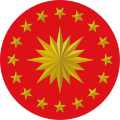Mustafa Kemal Atatürk's cult of personality

| ||
|---|---|---|
 |
||
Atatürk's cult of personality was started during the life of Mustafa Kemal Atatürk[1] and continued by his successors after his death in 1938, by members of both his Republican People's Party and opposition parties alike,[2] and in a limited amount by himself during his lifetime in order to popularize and cement his social and political reforms as a founder and the first President of Turkey.[3] The cult has been compared to similar personality cults in the authoritarian regimes of Central Asia and the Soviet Union.[4][5]
Overview
Following the defeat and

Atatürk's memory remains a major part of Turkish politics and society into the 21st century.
Atatürk's cult of personality is sometimes compared to those of authoritarian rulers of Central Asian countries, such as
The Economist wrote in 2012 that his personality cult "carpets the country with busts and portraits of the great man" and that this has been "nurtured by Turkey's generals, who have used his name to topple four governments, hang a prime minister and attack enemies of the republic."[13] According to this British weekly, "hard-core Islamists despise Ataturk for abolishing the caliphate in 1924 and expunging piety from the public space. They feed rumours that he was a womaniser, a drunk, even a crypto-Jew."[13]
A 2008 article in National Identities also discussed Atatürk's ubiquitous presence in the country:
Atatürk's houses exist in an Atatürk-inundated context with his face and sayings appearing on all official documents, buildings, television channels, newspapers and schoolyards, coins and banknotes. Moreover, regardless of personal belief, every Turk lives in a country where nationalism is part of standard political discourses. Politicians, teachers and journalists appeal to the nation and Atatürk on a daily basis. Yet they are not alone in this. The omnipresence of Atatürk paraphernalia can only be partly attributed to state sponsorship. Atatürk's face appears on posters behind supermarket counters, in barbershops and video stores, in bookshops and banks; Atatürk talismans even dangle from car mirrors, while Atatürk pins adorn lapels. And even the Turks who do not join in with such spontaneous commemorations know how to 'read' the Atatürk semiotic universe.[14]
Law on Atatürk
Statues
The first statue of Atatürk was sculpted in 1926 in the Sarayburnu district of Istanbul by Austrian sculptor Heinrich Krippel.[20] Today, statues of Atatürk can be found all over Turkey.[21][22]
See also
- Kemalism
- Atatürk's Reforms
- Benevolent dictatorship
References
- ISBN 978-3-95650-632-1.
- ^ ISBN 978-1-59020-924-0.
In 1937, Bayar had sought to outdo İnönü in his adulation of Atatürk. Now the Democrat Party government outdid him in signs of respect for Atatürk's memory. His body was transferred to a grandiose mausoleum in 1953. A law was passed in 1951 making it a criminal offense to insult Atatürk's memory.
- ISBN 9780292773639.
A man who was either irreligious or did not wear his faith on his sleeve, Atatürk established a cult of personality that has survived until now. He did not bother to attend the Friday prayers, a symbol of ruler-people unity...
- ^ Çandar, Cengiz (2000). Ataturk's Ambiguous Legacy. The Wilson Quarterly, 24(4), 88.
- ^ ISBN 9780815703211.
A state-promoted "cult of personality" is developing rapidly in some of the Central Asian republics (although here, as in other ... This was clearly modeled on Mustafa Kemal Ataturk, the authoritarian modernizing leader of republican Turkey.
- ISBN 9780470877739.
Mustafa Kemal was given the name Atatürk ("father of the Turks") by the Grand National Assembly
- ISBN 9781595262417.
The Turkish parliament proclaimed Mustafa's last name to be Ataturk, "Father of the Turks." Today, his picture hangs in every government office and business establishment, his state appears in every city, and his statues forbid that anything bad or ridiculous be said about him. Free Speech was not among Ataturk's reforms.
- ISSN 0362-4331. Retrieved 2023-09-02.
- ISBN 978-0-19-028965-2.
- ISBN 978-1-315-50824-5.
- ^ Foreign Press on Cyprus, Volumes 10-11, Public Information Office, 1997 "It is the army's self-appointed role to maintain the secular character of a state that is 90 percent Muslim, but whose modern founder Kemal Ataturk forcibly wrenched into Westernization. The Ataturk cult of personality still towers over Turkey"
- ^ "Court rules Student Oath should be reinstated in Turkey". Ahval News. Oct 18, 2018.
- ^ a b c "A secularist's lament". The Economist. 25 February 2012. Retrieved 17 March 2013.
- ^ Glyptis 2008, p. 356.
- ^ Bali, Rıfat N. (2007). New documents on Atatürk: Atatürk as viewed through the eyes of American diplomats. Isis Press. p. 32.
- ^ Seibert, Thomas (16 August 2011). "Some Turks ready to abolish law that protects memory of Ataturk". The National. Retrieved 13 July 2013.
- ISBN 9781845118754.
- ISBN 9780199733040.
- )
- ^ EĞRİKAVUK, IŞIL (9 January 2011). "Unaesthetic Atatürk monuments remain taboo in Turkey". Hurriyet. Retrieved 21 March 2013.
- ISBN 9780691088457.
Today the statue that is most frequently encountered all over Turkey is still that of Ataturk.
- ISBN 9780191640766.
Mustafa Kemal Atatürk was the central focus of public manifestations of memory. Sculptures of him spread across the country in a matter of years and well before his death adorned every main square in the country.
- Bibliography
- Copeaux, Etienne, ″La transcendance d'Atatürk″, in Mayeur-Jaouen Catherine (ed.), Saints et héros du Moyen-Orient contemporain, Paris, Maisonneuve et Larose, 2002, pp. 121–138.
- Glyptis, Leda (December 2008). "Living up to the father: The national identity prescriptions of remembering Atatürk; his homes, his grave, his temple". National Identities. 10 (4). London: 353–372. S2CID 145591969.
- Mandel, Mike, and Zakari, Chantal, The State of Ata. The Contested Imagery of Power in Turkey, Eighteen Publications, Boston, 2010, 256-xvi p.
Further reading
- "The Myth of 'New Turkey': Kemalism and Erdoganism as Two Sides of the Same Coin". Dr. Ceren Şengül. News About Turkey. 7 May 2024.

